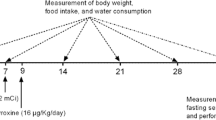Abstract
The effects of iodide on thyroid function were so far only studied after administration of pharmacological or small continuous doses. We were interested to know how the human thyroid gland would react to a more physiological situation: small doses taken in intermittently. Ten normal male volunteers were given weekly doses of iodide: 1 mg for the first 6 weeks and 2 mg afterwards for another 6 week period. Intrathyroidal iodine stores were evaluated by the X-Ray-Fluorescence method. The following thyroid parameters were estimated during the 3 months period: total thyroxine, total triiodothyronine, free thyroxine, free triiodothyronine, reverse triiodothyronine, plasma inorganic iodide, thyroid stimulating hormone and thyrotropin-releasing hormone tests. The following observations were made: i) a steady increase of intrathyroidal iodine (p < 0.01); ii) no changes in free thyroxine, free triiodothyronine, thyroid stimulating hormone, thyrotropin-releasing hormone test or plasma inorganic iodide, iii) a decrease of total thyroxine (and total triiodothyronine) with a nadir at about 3 weeks and a spontaneous rise afterwards; repetition of this phenomenon by doubling the dose of iodide. It is concluded that 1 mg or 2 mg iodide a week does not inhibit incorporation into the normal human thyroid gland and suggested that these physiological doses of iodide cause a transitory inhibition of thyroxine secretion, representing a form of autoregulation of the thyroid cell, since it was modulated by the intrathyroidal iodine stores and no evidence of pituitary mediation could be evidenced in the experimental protocol.
Similar content being viewed by others
References
Dunn J.T., Medeiros-Neto G.A. Endemic goiter and cretinism: continuing threats to world health. PAGO, Scientific Publication, Washington, 1975, p. 292.
Grayson R.R. Factors which influence the radioactive iodine uptake test. Am. J. Med. 28: 397, 1960.
Aabach H.S. Jodutskilleslse i urin, i relasjon til forskjellige viktige fodemidler. Intern. Rapport F-365, Forsvarets Forskningsinstitutt. Norwegian Defence Research Establishment, Norway, 1976.
Hoffer P.B., Jones W.B., Crawford R.B., Gottschalk A. Fluorescent thyroid scanning: a new method of imaging the thyroid. Radiology 90: 342, 1968.
Stanley M.M. The direct estimation of the rate of thyroid hormone formation in man. The effect of the iodide ion on thyroid iodine utilisation. J. Clin. Endocrinol. Metab. 9: 941, 1949.
Berson S.A., Yalow R.S. Quantitative aspects of iodine metabolism. The exchangeable organic iodine pool and the rates of thyroidal secretion, peripheral degradation and fecal excretion of endogenously synthesized organically bound iodine. J. Clin. Invest. 33: 1533, 1954.
Koutras D.A., Alexander W.D., Mc Harden G.R., Sir Edward Wayne. Effect of small iodine supplements on thyroid function in normal individuals. J. Clin. Endocrinol. 24: 857, 1964.
DeGroot L.J. Kinetic analysis of iodine metabolism. J. Clin. Endocrinol. 26: 149, 1966.
Feinberg W.D., Hoffman D.L., Owen C.A. The effects of varying amounts of stable iodide on the function of the human thyroid. J. Clin. Endocrinol. 19: 567, 1959.
Ermans A.M., Verelst J. Acute effects of supra-physiological doses of iodine in the human being: management of non-toxic goiter. J. Mol. Med. 4: 199, 1980.
Jonckheer M.H., Deconinck F. X-ray-fluorescence determination of stable iodine in the thyroid gland. A review. Acta Clin. Belg. 37: 92, 1982.
Jonckheer M., Blockx P., Molter F. Use of the achilles-tendon reflex in thyroid clinical investigation. Acta Endocrinol. (Kbh.) 63: 175, 1970.
Riley M., Gochman A. A fully automated method forthe determination of serum protein bound iodine. Technicon Symposium, New York, 1964.
Deconinck F. Medische toepassingen van halfgeleiderdetectoren. Ph.D. Thesis, V.U.B., Brussels, 1977.
Puttemans F., Deconinck F., Jonckheer M.H., Vandeputte M., Massart D.L. X-ray fluorescence and potentiometry compared for determining iodine contents of thyroid glands. Clin. Chem. 25: 1247, 1979.
Mandart G., Erbsman F. Estimation of thyroid weight by scintigraphy. Int. J. Nucl. Biol. 2: 185, 1975.
Reinwein D., Durrer H.A., Meinhold H. Iodine thyroxine (T4), triiodothyronine (T3), 3,3′,5′-triio-dothyronine (rT3), 3,3′-dioiothyronine (T2) in normal human thyroids. Effect of excessive iodine exposure. Horm. Met. Res. 13: 456, 1981.
De Combrugghe B., Beckers C, De Visscher M. General aspects of iodine metabolism in sporadic goiter. Acta Endocrinol. (Kbh.) 42: 300, 1963.
Ermans A.M., Kinthaert J., Camu M. Defective intrathyroidal iodine metabolism in non-toxic goiter: inadequate iodination of thyroglobulin. J. Clin. Endocrinol. Metab. 28: 1307, 1968.
Jonckheer M.H., Coomans D., Broeckaert I., Van Paepegem R., Deconinck F. Seasonal variation of stable intrathyroidal iodine in nontoxic goiter disclosed by X-ray fluorescence. J. Endocrinol. Invest. 7: 27, 1982.
DeGroot L.J., Stanbury J.B. The thyroid and its diseases. John Wiley and Sons, New York, 1975, p. 122.
Yukimura Y., Ikejiri K., Kojima A, Yamada T. Effect of excess iodide secretion in normal or hypophy- sectomized rats treated with graded doses of thyroid hormone. Endocrinology 99: 541, 1976.
Studer H., Burgi H., Kohler H., Garcia M.C., Morreale de Escobar G. A transient rise of hormone secretion: a response of the stimulated rat thyroid gland to small increments of iodie supply. Acta Endocrinol. (Kbh.) 81: 507, 1976.
Wolff J., Chaikoff Plasma organic iodide as a homeostatic regulator of thyroid function. J. Biol. Chem. 174: 555, 1948.
Trost B.N., Buchli R., Osterwalder H.J., Kohler H., Konig M.P., Studer H. The handling of moderately excessive iodide loads by normal and goitrous human thyroid glands. J. Mol. Med. 4: 167, 1980.
Kohler H., Opl W., von Muhlenen A., Burgi H., Studer H., Ornston B.J., Hall R. Failure of TSH radioimmunoassay to consistently detect mild TSH mediated thyroid stimulation. Clin. Endocrinol. (Oxf.) 2: 327, 1973.
Author information
Authors and Affiliations
Rights and permissions
About this article
Cite this article
Jonckheer, M.H., Michotte, Y., Van Steirteghem, A.C. et al. The adaptation of the human thyroid gland to a physiological regimen of iodide intake: evidence for a transitory inhibition of thyroid hormone secretion modulated by the intrathyroidal iodine stores. J Endocrinol Invest 6, 267–272 (1983). https://doi.org/10.1007/BF03347588
Received:
Accepted:
Published:
Issue Date:
DOI: https://doi.org/10.1007/BF03347588




